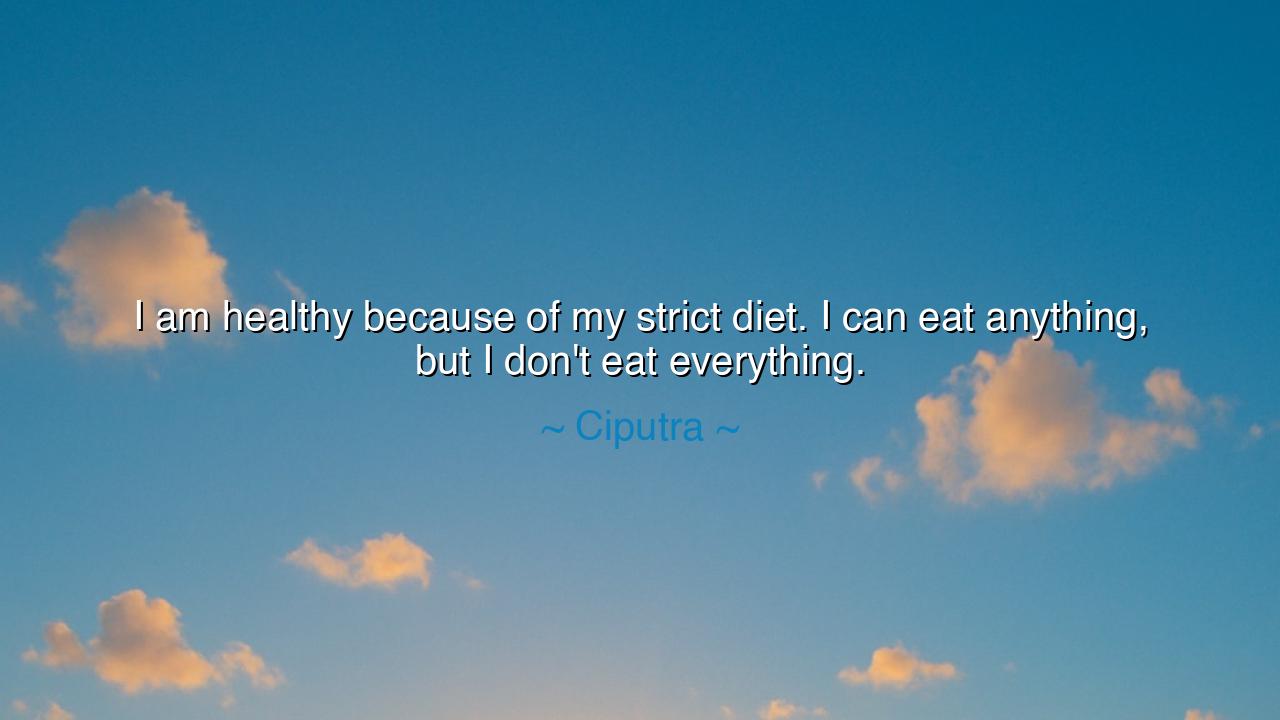
I am healthy because of my strict diet. I can eat anything, but I
I am healthy because of my strict diet. I can eat anything, but I don't eat everything.






In the long and winding path of life, where the body and soul are inextricably intertwined, there exists a profound truth about health and discipline. Ciputra's words—"I am healthy because of my strict diet. I can eat anything, but I don't eat everything"—offer us a powerful lesson about the power of choice. This statement, though simple, carries with it the weight of ancient wisdom. For to truly be healthy is not merely to indulge in the pleasures of the world, but to embrace restraint, to make conscious decisions that nurture the body, mind, and spirit. To understand Ciputra’s words is to understand the balance between what is available to us and what is best for us—a balance that the ancients knew well.
In ancient Greece, the great philosopher Aristotle spoke often of the golden mean, the idea that virtue lies in moderation. He believed that excess in anything—even good things—led to imbalance, while restraint and moderation brought one closer to true fulfillment. In the context of diet, Aristotle would have praised Ciputra’s approach. By choosing to eat only what nourishes and abstaining from excess, one lives a life of balance, avoiding the pitfalls of indulgence and excess. Aristotle’s wisdom echoes in Ciputra’s words, reminding us that to eat anything does not mean to consume everything. True health lies in discerning what truly serves the body and what leads to self-destruction.
The ancient Romans, too, understood the value of moderation and self-restraint. The philosopher Seneca often wrote about the importance of controlling one’s desires, especially when it came to food. He believed that the control of the body was one of the highest forms of wisdom, for by disciplining ourselves in what we consume, we gain mastery over the mind and the spirit. Seneca would have admired Ciputra for his strict adherence to a diet that prioritizes health over indulgence. By choosing not to eat everything, Ciputra follows the ancient path of self-discipline, recognizing that health is not something that is bestowed upon us, but something we must cultivate through our choices.
In the distant lands of India, the ancient sages of Ayurveda taught that true health arises from balance—not only in the body but also in the mind and spirit. Ayurveda emphasizes that food is medicine, and the key to health lies in eating in harmony with one’s unique constitution, the seasons, and the rhythms of the natural world. The practice of eating in moderation, and selecting foods that nourish rather than burden the body, is central to this ancient tradition. Ciputra’s insight mirrors these teachings: he chooses a strict diet, not out of denial, but out of respect for his body’s needs. Just as the Ayurvedic sages counseled restraint and balance, so too does Ciputra recognize the importance of choosing wisely what one consumes.
The lesson from Ciputra’s words is one that has echoed through the ages: true health is not about restriction for its own sake, but about discernment and choice. In a world where everything is available, where every desire can be satisfied, it is easy to fall into the trap of indulgence. Yet, the ancients knew that the key to health lies not in satisfying every craving, but in understanding what is truly needed and what serves us in the long run. To eat anything is a luxury, but to not eat everything is a sign of true wisdom. It is a recognition that health is not given to us by chance, but by the discipline we maintain in our choices.
In our own lives, let us take this lesson to heart. Ciputra calls us to examine our relationship with food and to recognize that our health is a reflection of the choices we make daily. Let us learn to eat with awareness, choosing foods that nourish and strengthen the body rather than those that provide fleeting pleasure but leave us weakened. Like Aristotle, Seneca, and the Ayurvedic sages, we must cultivate moderation and discipline in all things, understanding that true vitality comes not from excess, but from a life lived in balance and harmony.
Let us honor our bodies as temples of life, nourishing them with the wisdom of the ancients, who knew that health is not a passive gift, but an active practice. By choosing what we consume with care, by listening to our bodies, and by embracing discipline, we can cultivate lives of vitality, strength, and clarity. In doing so, we honor the timeless wisdom that health is not just about what we eat, but how we choose to live. By following the path of restraint and balance, we lay the foundation for a life of lasting well-being and fulfillment.






AAdministratorAdministrator
Welcome, honored guests. Please leave a comment, we will respond soon